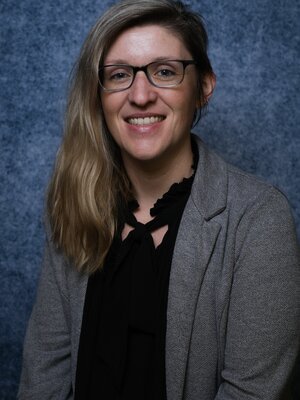
Stephanie Matt, Class of 2018
by Virginia Wright
As of July 2023, Stephanie Matt is a Research Assistant Professor at Drexel University College of Medicine in Philadelphia, Pennsylvania. After five years of working as a postdoctoral researcher for Drexel, she recently won an NIH Mentored Research Scientist Development Award (K01) to investigate the role of antidepressants in HIV infection and inflammation in myeloid cells such as macrophages and microglia. Receiving this grant provided not only mentored support for her research career but also a place within Drexel University faculty. “It took me about two years in terms of formulating, submitting, and resubmitting the grant, but once I got it, I was able to get the promotion right away,” she explained. “With this K01, I am thrilled to be starting my own line of research and preparing to build a lab of my own. I’ve mentored undergraduates, master’s, and PhD students already for quite a while, but never in a faculty role. It will be exciting.”
Matt also reflected on her time spent within laboratory settings. She first began assisting with research as an undergraduate double-majoring in neuroscience and psychology. This experience gave Matt her “spark” for pursuing a PhD. After receiving her bachelor's degrees from the University of Delaware, she immediately commenced her graduate work at the University of Illinois Urbana-Champaign. “What I liked most was just having, for the first time, the independence and tools to pursue the research questions that I was interested in,” she remembered. “I felt like there was always something unique to explore. And being in the Department of Animal Sciences but still part of the Neuroscience Program was a great interdisciplinary opportunity.”
Matt concentrated on neuroimmunology as a graduate student, primarily working on mice with the guidance of Dr. Rodney Johnson. She believes that her PhD thesis on neuroinflammation in aging mice maintains “some translational value” for human subjects. “I think understanding how to combat inflammation as we age, especially in the brain, is huge since a lot of people are living longer and the elderly population is increasing,” she remarked. Having long transitioned from studying mice to studying humans, Matt’s current research examines neuroinflammation, neurotransmitter dysregulation, and viral persistence in people living with HIV and depression. “I really hope that with this research I can have an impact on issues surrounding polypharmacy, inflammation, and neurodegeneration.”
Although Matt continues to work within neuroimmunology, her research has deviated even further from what she calls “classic” neuroscience. “In my current Department of Pharmacology and Physiology, we take a more multisystem approach and have research interests in not just disorders of the central nervous system but also cancer and cardiovascular/metabolic disorders. I believe getting so many perspectives from different areas of expertise makes my own research stronger.” Further extending the boundaries of neuroscience, her research methods for studying peripheral cells draw inspiration from neurological techniques. “We work with stem cells that are supposed to model microglia, neurons, and astrocytes, but we also work with stem cells that are supposed to model peripheral cells such as macrophages. I feel like it's still similar research, just expanded into a lot more models and systems, which is important for better understanding of different tissue environments in humans in vivo.”
While she was only asked to provide one fond memory from her time as a graduate student, Matt had many more answers ready to offer. From the co-op theatre to the Pygmalion festival, from the joint birthday parties to the beer/wine clubs and cooking with friends, she was involved in not only continuing traditions on campus but also starting her own. “I did the half marathon every year, which was always fun,” recalled Matt. “My husband and a couple of the graduate students would be passing out beer on the sidelines around mile eleven every year. That was a nice tradition.”
Since graduating from the Neuroscience Program in 2018, Matt married her husband (an “honorary Neuroscience Program member”) in 2021, and they are now preparing to buy their first house together. During this time of personal and professional advancement, however, with her and her husband navigating COVID, Matt explained how experiencing that difficult time encouraged her to find a better balance between both work and life. “I think having more time for those personal things is really important, as well as appreciating what you have a little bit more. That was all incredibly challenging, but we’re getting through it, and I think I’ve become a stronger person for it.” To that end, Matt and her husband take every chance they get to visit friends from the Neuroscience Program who now live all over the world. “The five years we lived in Illinois were some of the best years of our lives, it is such a special community and we met some of the greatest friends we will probably ever have”